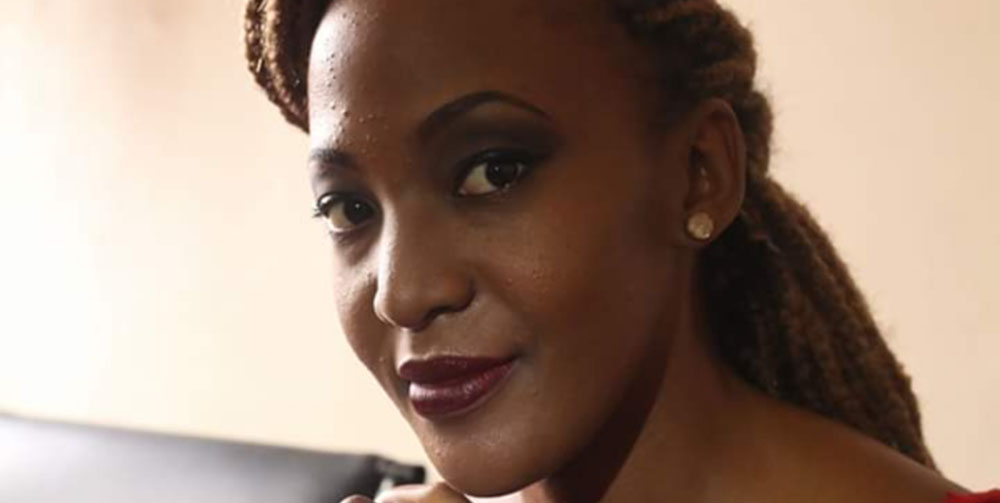Daphne Ampiire Rubaramire, is a prominent Ugandan actress, screenwriter and businesswoman with numerous film credits to her name. She has featured in award winning TV series ‘The Hostel’, ’27 Guns’, ‘Maisha’, ‘Muzigo Express’, ‘Love Makanika’ among others. She is also an accomplished screen writer, who wrote the script of 2019 groundbreaking film ‘Bed of Thorns’, Uganda’s first all-female crew film that tackles Gender Based Violence. She recently ventured into film production which according to her, is quite tough and brutal but very necessary, in order to pave way for future filmmakers. She says she was compelled to take that direction because she never wants to see a good story not done. “We are not going to go to box offices by chance and wishes, someone has to sacrifice themselves and be bold enough to produce it and really run after it.”
Daphne spoke to GLIM about her latest film project ‘November Tear’, the Uganda film industry, among other things, in this exclusive interview.

What is the film ‘November Tear’ about?
‘November Tear’ is a film about trafficking of women in Kampala, a very silent issue that almost goes unnoticed. Its also a story of destinies kind of crossing paths. A young lady is trying to get from one village to another, she falls into the hands of traffickers. That’s really the story but we wanted to give light to the whole trafficking situation without making it really gloomy and sad.
What was your role in the film?
My character was called Anenda. Anenda is the girl who is trying to get from one town to another. She highlights the crazy that goes on in the city as well as family drama.
What inspired you to take on the role?
My friend Sanyu Aganza and Mr. Richard Mondo the director of ‘November Tear’ together with their team, wrote a really amazing script. When I read it, I was like are you kidding me? I’m in and they were looking for someone who could speak Runyakitara really well. I was like, I am quite well versed with the language, let me do it.
In which ways did you feel connected to the character?
Apart from being a Mukiga, Anenda’s life was very different from my own so she was a beautiful challenge. She had no mum and I too have none, so I understood exactly what she was going through taking care of her father and sister, that way I related with her. I related with her spirit of bravery, her independence and wanting to follow her wishes and not allowing people to make decisions for her.
What did you like most and least about playing the character?
I liked how different she was from me. I liked that she was a village girl with a heavy Rukiga accent. Those are the things that to me challenge an actor to go deeper and promote their growth. You should have seen me. I looked completely like I was from a deep village after a few days of having short hair and not smearing Vaseline on my body. I was like wow, I fit in perfectly. I don’t think there’s much I didn’t like about the character. I found her a little weird though. She had a love triangle she never quite finished. I was annoyed.
What was your favorite part of filming the movie?
Mostly the early mornings and there was a particular scene that we had with one of my cast mates whose role was terribly rude. I almost got caught laughing in every take. I kept spoiling the takes because I couldn’t take it. She was hilarious!
What was your last day filming ‘November Tear’ Like?
It was painful. We were sore and tired. We had not slept, we were like let’s just go home. But it was really beautiful. We went along the shores of Lake Victoria, it was amazing. That was the very last scene we shot.

We have seen some actresses like Rehema Nanfuka and Eleanor Nabwiso venture into directing and are doing an amazing job churning out multi-award winning films. Have you thought of taking the same route?
I am very careful about directing, I fear to direct people badly. I think it’s more of fear to do the wrong thing but hopefully as we make more independent projects, I will give it a go. Someone challenged me to do it last year, I was like no no no, let me focus on one thing. I don’t know, this year still has a few months to go, let’s see how it goes.
Uganda’s film industry is male dominated. What do you think can be done to ensure equal representation of women?
First let me say Male dominating doesn’t mean women don’t have a place. I don’t think the men are going to say this is our turf, the women don’t enter. But it’s true you find challenges gaining the respect perhaps a man would easily gain on a set but I think it comes down to the quality of the work that you do. Eventually the people respect you for the work you do.
What do you think can be done about it?
The men should give women opportunities. It doesn’t hurt to say ‘in every project I do, I will have a female assistant director so that she can learn how to be a good director’. Also, let them fly off the way we did with ‘Bed of Thorns’ and produce their own films and celebrate what they have done. Challenge themselves too because sometimes we don’t even know what the problem is, until you challenge people and they are like ‘me I even fear talking to people, I can’t lead’, but a director has to be all those things. They have to be good with the actors, crew, general production and have a very good vison. I would additionally encourage the women to be very aggressive because if they are not aggressive enough, the men won’t sit back.
Why do you think it’s hard for female producers and directors to succeed in our film industry?
Perhaps they are not very interested, they just love the camera. They want to be in front of it and don’t care to be behind it. You find that most men naturally don’t want to be seen in front of the camera but want to be part of film, so they easily take up the behind the scenes roles. Another challenge is what we discussed earlier, feeling that their knowledge and opinion will not be respected, while some don’t think it’s a female place. Lack of knowledge is another challenge which I think there’s space for. You just need to learn and understand what you are doing, even the men will respect you; because at the end of the day, we are all just trying to come up with a good project.
Uganda recently became eligible to participate in the Oscars Academy Awards, the world’s biggest and most prestigious film awards. What does this mean to you as a stakeholder in the film industry?
It’s a beautiful challenge, I like. If we handle it correctly it will impact our industry in a positive way. We need to take away silly competitions and grudges over ‘why did your film do better than mine’ that’s child’s play, this is business, this is real. If the Oscars is taking your work seriously, that means cash down, talent up. I feel like the actors should take it seriously and get professional. The filmmakers should take it seriously and get as professional as they possibly can, open themselves up to the wider society and world of film. What! It’s a grand opportunity, if we waste it, then that’s on us, it’s not on them.

Quick Five:
- Last thing I googled
Price of baking flour in Uganda - First thing I do when I wake up in the morning
Make my alarm stop because I really want to just go back to sleep. - First thing I would do if I became a president for a day
Sit down with my notebook and listen, because sometimes we are bad leaders because we don’t know the problems our people are facing. - If I could meet one person alive or dead, it would be
Myles Munroe - My current read is
‘Seven Habits of Highly Effective People’ by Steven R. Covey
Directed and produced by Nondo J. Richard, and starring Daphne Ampiire, Cindy Sanyu, Okuyo Joel Atiku, Mushema House, River Dan Rugaju, among others, ‘November Tear’ will be premiered at a red carpet event that will take place on August 11, at Century Cinemax Acacia, in Kampala.

